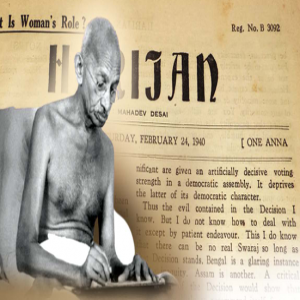
 Fr. Gaurav Nair
Fr. Gaurav Nair

When we think of journalism, Gandhi is very often not the first person to come
to mind. However, we forget that he was a journalist. Mahatma Gandhi's
approach starkly contrasts the trends of ethical compromises, and the dete-
rioration of integrity through political and corporate clout. In today's situation, when
the Godi media seems to dominate with a mix of propaganda and factionalism, the core
tenets of Gandhian journalism have become more relevant than ever.
Gandhi believed that journalism was about reporting facts and upholding the truth,
even when it was uncomfortable or dangerous. In his view, "The sole aim of journalism
should be service." For Gandhi, the power of the pen was not in crafting clever headlines
or amplifying voices of power but in exposing injustice and enlightening the masses with
a moral compass.
With all major news outlets operating as mouthpieces for the government, the space
for independent, critical journalism has shrunk. News coverage is often tailored to fit
the interests of the BJP-RSS rather than holding them accountable. On the other hand,
Gandhi's vision of journalism insists on fearlessly exposing the flaws of even the most
powerful and advocating for the marginalised.
In a media environment that thrives on conflict—be it political, social, or even
personal—Gandhi's principles of peace and non-violence seem like a distant dream. Yet,
journalism must strive to uphold precisely these values. Gandhi understood that words,
like actions, could harm or heal.
The BJP-RSS alliance has repeatedly used media platforms to stoke communal
tensions, anathematise minorities, and suppress dissent. Emphasising peace and non-vi-
olence in the face of it becomes a revolutionary tactic. We must reject the language of
violence and division, instead promoting dialogue, reconciliation, and understanding.
Gandhi's journalism was about resistance. He used his words as weapons against
colonialism. Today, journalism in India faces its own form of persecution—one that
comes not from foreign rulers but from a government that seeks to asphyxiate its own
people and their voices. The government's attacks and detention of dissidents have
created a climate of intimidation.
Gandhi faced similar repression but remained steadfast in his belief that the press
must remain a force for good even in the face of adversity. Journalists today, especially
those under attack by the government and its fundamentalist allies, must take inspira-
tion from Gandhi's courage.
One of the most significant challenges in modern journalism is overcoming the
general public's apathy. In a society saturated with endless information streams, the
public's attention is often drawn to the trivial and tends to overlook the urgent. Celeb-
rity culture, fueled by media, has distracted from the real issues. Gandhi vehemently
opposed this trend, believing journalism should focus on uplifting the public conscious-
ness, not pandering to its basest instincts.
In Gandhi's view, journalism was a sacred duty that required the highest levels of
integrity and ethical rigour. Journalism should be a force for justice, a tool for social
change, and a platform for truth. It is time for modern journalists to reclaim their ideals
and use the power of the pen to serve the people, not the powerful.